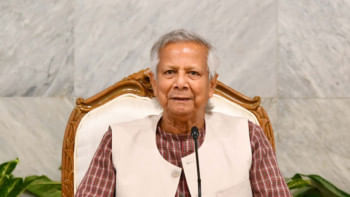Where is the economy heading?

This is exactly the question I came across from the investment community in the US, India, and Singapore in the last one month or so. They asked where the exchange rate may settle down and the local currency borrowing rate may go. If they invest in Bangladesh, will they be able to take back their return on investments timely and easily?
Bangladesh's economy continues to face headwinds owing to high inflation and low forex reserves. Imports, ranging from capital machinery to raw materials and industrial goods, have experienced a decline for the second consecutive year, largely attributable to the ongoing dollar crisis.
Both GDP growth and job creation show signs of decline and private investment remains stagnant and inequality and poverty are on the rise.
The recent turmoil can also be blamed on the internal fault lines that have long remained unaddressed. There are several fault lines including the mess in the banking sector, the diversion of remittances to informal channels, export proceeds not being repatriated on time, issues with governance and institutional capacity, low revenue collection, rising public debt, and regulators' stubborn stance on exchange and interest rates for long.
The economy's capacity to absorb shocks has weakened significantly in recent times. Persistent high inflation for around two years has reduced the purchasing power of the poor and their living standards.
The World Bank's Poverty Outlook for Bangladesh showed nearly half a million Bangladeshis will fall into extreme poverty between FY2022-23 and FY2023-24. This section of the population is expected to survive on less than $2.15 a day.
According to the World Food Programme, almost 40 million people were identified as food-insecure. The trend has been observed to steadily increase from May 2023.
The tightening of imports has had repercussions on production with its spillover effects being felt in investment and employment generation.
Bangladesh Bank data shows a continuous decline in overall imports for two consecutive years. Imports decreased nearly 16 percent in FY23. In July-February of the current fiscal year, it saw a further decrease of 15.36 percent, year-on-year.
A more alarming concern is the decline in the opening of letters of credit for imports of capital machinery, which dropped 19 percent in July-February. Imports of industrial raw materials and intermediate goods experienced declines of 4.09 percent and 17 percent, respectively.
The stagnation of private investment, which has been the primary driver of Bangladesh's impressive economic growth for over a decade, barring the pandemic year, remains a significant concern.
Without a substantial increase in both local and foreign private investments, Bangladesh will struggle to sustain economic growth and generate much-needed jobs for the approximately 2.5 million youths entering the workforce each year.
Also, we have not succeeded in building a dynamic private sector. Instead of being utilised for productive purposes, bank loans are being laundered and allegedly siphoned off the country.
Foreign direct investment remains significantly lower at 0.7 percent of GDP, largely due to an unfriendly business environment. On the other hand, persistently high inflation is eroding people's purchasing power and savings capacity.
Fresh investments are insignificant. Those who are already present are reinvesting. The primary issue with FDI is that investors encounter challenges when repatriating profits. Also, a complicated tax regime adds to the obstacles.
In the face of these challenges, we emphasise the need for policy interventions to invigorate private sector investment, foster savings, and increase investor confidence through better marker management, in order to propel economic growth and create jobs. Without such measures, Bangladesh will find it harder to attain the status of a middle- and higher-income nation.
The author is an economic analyst

 For all latest news, follow The Daily Star's Google News channel.
For all latest news, follow The Daily Star's Google News channel. 



Comments